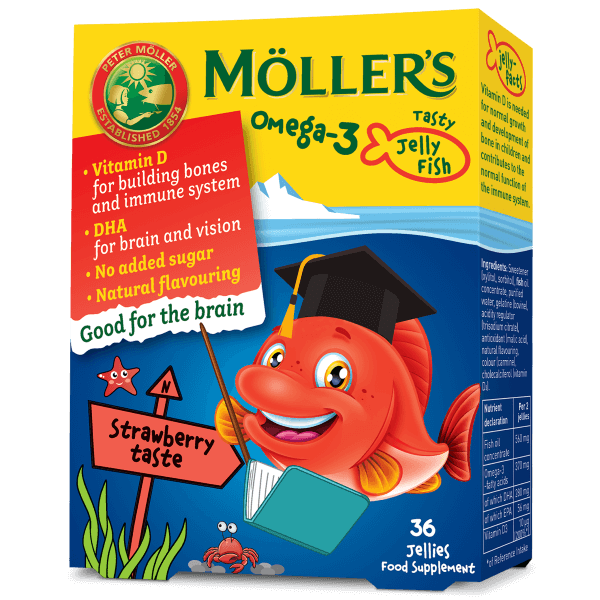Omega 3s are fatty acids that are vital for the healthy growth and development of infants and children. Here's what you need to know.
🕒 4 min read
The two important omega 3s found in fish oils are DHA and EPA – and they're both important for children's health.
DHA is incorporated into brain cell membranes, where it helps to maintain their flexibility and the transmission speed of electrical and chemical messages. This makes DHA vital for the development of normal brain and eye function.
EPA also plays an important role in cell communication, and in suppressing inflammation.
Where do children get omega 3?
During development in the womb, the placenta extracts and concentrates omega 3 from the maternal circulation so that fetal levels of DHA are twice as high as in the mother.
This DHA is transported to the baby's central nervous system and incorporated into brain cells, and makes up to 15% of the weight of the baby's cerebral cortex.
DHA is also concentrated in the light-sensitive cells at the back of a developing baby's eyes, where it makes up around 50% of the weight of each retina.
Omega-3 foods
After birth, infants obtain DHA from breast milk or from fortified formulas.
Unfortunately, omega-3 sources are relatively few, so after weaning children have to obtain omega 3s from foods such as fish, eggs, nuts (especially walnuts), flaxseed and rapeseed oils. Furthermore, these omega 3s are present as ALA, of which only a small amount is converted into the important long-chain omega 3s, DHA and EPA.
So, unless children eat fish – especially oily fish such as herrings, kippers, salmon, mackerel and pilchards – twice a week, they may not get sufficient omega 3 to meet their needs. Although brain cells can use other types of fatty acids when DHA is in short supply, this will result in less flexibility in their membranes, and this may affect brain function.

Cod liver oil and omega 3s are among the most popular food supplements, but how do they differ and how do you choose which is right for you?
Find out more
Omega-3 fish oil benefits
Some evidence suggests that a diet providing too few omega 3s during pregnancy may be linked with an increased risk of the offspring developing dyslexia or attention deficit hyperactivity disorder (ADHD). A good fish oil intake may also play an important role in school performance.1
Attention deficit hyperactivity disorder (ADHD)
Benefits were seen in a trial involving 50 children with ADHD (on medication) who received either a fish oil formula or placebo for four months.
Those receiving fish oils showed significant improvements in conduct (parent ratings) and attention (teacher ratings), with 75% no longer showing oppositional defiant behaviour (clinical ratings).
Ability to listen to, and follow, instructions also significantly improved.2
When the results from ten trials involving 699 children were analysed, omega-3 supplements were found to have a significant effect on ADHD symptoms. In particular, the EPA dose was linked with supplement effectiveness.3
The researchers suggested that it may be reasonable to use supplementation with omega-3 fatty acids to increase the benefits of standard medical treatments.
Dyslexia
Early studies involving children aged eight to 12 years with dyslexia found that those receiving fish oil supplements for six months had substantial improvements in reading skills.4
Other studies have had conflicting results, however, and more research is needed to confirm this.
Sleep problems
Healthy brain function is needed for a healthy sleep pattern, and lack of omega 3s may contribute to sleep difficulties.
A study involving children aged seven to nine years found that sleep disturbance scores were significantly linked with lower blood DHA levels. Those that were given an omega-3 supplement for 16 weeks suggested an average of seven fewer wake episodes and 58 minutes more sleep per night compared with those taking placebo, although further investigations are needed to confirm this.5
Asthma
Omega 3 fatty acids are also converted into substances (series 3 prostaglandins and series 5 leukotrienes) that help to reduce inflammation, and deficiency may worsen inflammatory conditions such as asthma.
Findings from 11 studies, involving over 99,000 infants, children, pregnant or breast-feeding women, have concluded that good intakes of omega-3 fish oil may help to prevent asthma in children.6
Omega-3 supplements for children
Children are notoriously fussy about their diet and, if a child does not like eating fish, an omega-3 supplement is a great alternative. As an added benefit, fish oil supplements are purified and distilled to ensure they are virtually free from marine pollutants.
The best omega-3 supplement for children is likely to be a gummy – or perhaps an omega-3 fish oil flavoured with citrus oils for taste.

Möller's Omega 3 Jelly Fish Strawberry Gummies
Chewable omega-3 gummies for brain, vision, and growth and development in children
- Tasty alternative for adults who don't like swallowing capsules or liquid fish oil
- Perfect for kids: easy to chew and swallow, no added sugar, a fruity fragrance with no fishy smell
- Two jellies provide 280mg DHA, 56mg EPA and 10mcg vitamin D3
Dosage for children
For children aged 3 to 12, a typical daily dose is 280mg DHA and 56mg EPA.
For children aged 12 and above, a typical daily dose is 500mg DHA and 400mg EPA.
Cod liver oil supplements that are often given to children provide these important omega-3 fish oil benefits as well as the addition of vitamins A and D.
Shaking fish oil together with milk or juice will break it down into tiny, suspended globules (an emulsion) that may make it more palatable for children, as well as aiding absorption. This is the process that occurs naturally in the stomach and helps to avoid 'fishy burps'.






